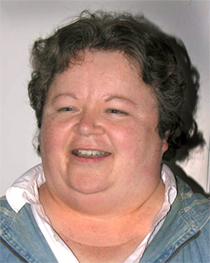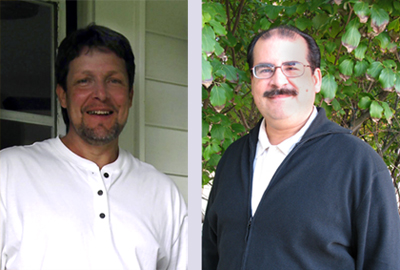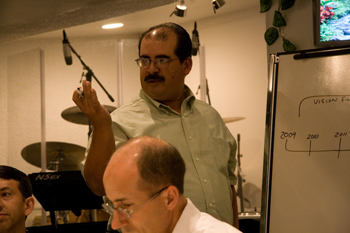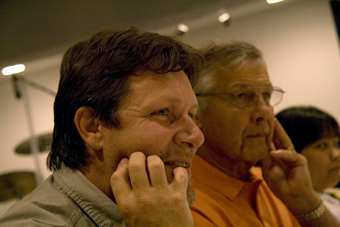Wanda Lindsay
with Jennifer Smith
 “Speak up for those who cannot speak for themselves, for the rights of all who are destitute. Speak up and judge fairly; defend the rights of the poor and needy.” Proverbs 31:8-9
“Speak up for those who cannot speak for themselves, for the rights of all who are destitute. Speak up and judge fairly; defend the rights of the poor and needy.” Proverbs 31:8-9
One evening ten years ago, I got tired of reading stories about crime and mental illness. Where were the positive, happy stories? I said to God, “There must be fairness for people with mental illness.” God asked me, “What are you going to do about it?” I replied, “Tell my story.”
Together We Strive
Wanda Lindsay is a woman on a mission. Eleven years ago, she founded “Together We Strive”, an organization with the mission of de-stigmatizing mental illness. Through presentations to area groups, written articles and editorials, and participation in community events, Wanda continually spreads her message of hope with passion and conviction.
I approached Lu Mauro, Director of Penn Foundation’s Wellspring Clubhouse with my idea. With her help, I wrote a grant and the Developmental Disabilities Planning Council (Harrisburg, PA) gave me money to begin my work as a mental health community advocate and educator. I’ve shared my story to numerous groups such as churches, schools, and service and civic clubs.
Learning to Trust
Wanda was diagnosed with Schizo-Affective Disorder at the age of 24. A few years prior to her diagnosis, Wanda had lost both her mother and grandmother in the same year. This resulted in her having to move, and she began to drink on the weekends and then at home during the week. Wanda also began to hear voices.
When I came to Grand View Hospital, I believed that I only had one week to live. I left the hospital in 1987 and met Christine Shannon, Director of Residential Services at Penn Foundation. After speaking with Christine, I entered Penn Foundation’s Community Residential Rehabilitation Program. I always credit Chris with the start of my recovery. I learned to trust Penn Foundation, that they would help me, and I needed them to help me understand my illness. They were instrumental in that process.
Power of Hope and Possibility of Recovery
Penn Foundation strongly believes that every individual who comes through its doors has the potential to recover and live a fulfilling life. Mental illness does not have to mean a life sentence of hospitalizations, medications, and being alone. Today, mental illness can empower rather than hinder. To that end, the agency offers numerous rehabilitation programs to help individuals like Wanda live independent, purposeful lives.
The Wellspring Clubhouse, of which Wanda is a member, was started in 1994 to provide social, educational, and vocational opportunities to adults with mental illness and adults with co-occurring mental health and substance abuse issues. Members work side-by-side with staff in three work units – Kitchen & Housekeeping, Member Services & Administration, Employment & Education – to learn basic living skills and accomplish the tasks needed to keep the Clubhouse open and operational.
Call It Life, Call It a Reason to Live
My struggle with mental illness led me to discover my purpose in life – to educate people about mental illness, to help them to realize that mental illness is just like any other illness, to make them understand that people can live “normal” lives despite a mental illness. Five things that truly helped me in my recovery were 1) Faith in God, 2) Trust in myself and others, 3) Friends and family support, 4) Wanting to get better, and 5) Taking responsibility.
Never once at Penn Foundation did I hear, “Wanda, you can’t do this or that because you have a mental illness.” Rather, I heard, “How can we support you? How can we help?” Today, in addition to my work as a speaker on mental illness, I work at the Apple Orchard Café at Souderton Mennonite Home.
The greatest lesson I have learned has been the importance of having purpose, self-esteem, and self-confidence. I received these things through people who believed in me and gave me chances. My greatest hope is that people will continue to help and support me in giving a voice to mental illness.
photo provided by Wanda Lindsay

 About 90 percent of Indonesians are Muslim and there’s a long history of conflict between the two groups. Many Indonesian Christians, including about half of the Indonesian community in South Philly, have migrated to the United States because of religious persecution.
About 90 percent of Indonesians are Muslim and there’s a long history of conflict between the two groups. Many Indonesian Christians, including about half of the Indonesian community in South Philly, have migrated to the United States because of religious persecution.
 Redemptive renewal…a fully-engaged peoplehood…drawing on the best of the Anabaptist tradition…God’s unfolding reign in our midst…opening up to the world…coming together…appreciating differences…a passionate call and gifting…offering ourselves like Jesus did…
Redemptive renewal…a fully-engaged peoplehood…drawing on the best of the Anabaptist tradition…God’s unfolding reign in our midst…opening up to the world…coming together…appreciating differences…a passionate call and gifting…offering ourselves like Jesus did…  Nevertheless, Noel has been impressed with the longevity and resilience of the Franconia Conference community. “With its many up and down times, the people of Franconia have adjusted, readjusted, and refocused their efforts on that which they believed God was calling them to. I have seen and experienced this response…I have experienced Franconia opening herself up to the world…in ways that demonstrate the goodness of God in those who came before us.”
Nevertheless, Noel has been impressed with the longevity and resilience of the Franconia Conference community. “With its many up and down times, the people of Franconia have adjusted, readjusted, and refocused their efforts on that which they believed God was calling them to. I have seen and experienced this response…I have experienced Franconia opening herself up to the world…in ways that demonstrate the goodness of God in those who came before us.” Surely this is vision for a healthy, growing Christian body, equipped to share good news in a diverse environment. May Franconia Conference, with all her strengths and weaknesses, find a part in this expanding community of God’s Kingdom.
Surely this is vision for a healthy, growing Christian body, equipped to share good news in a diverse environment. May Franconia Conference, with all her strengths and weaknesses, find a part in this expanding community of God’s Kingdom.